The following is a transcript of the presentation video, edited for clarity.
In the Beginning … Pre-Lessons for Success
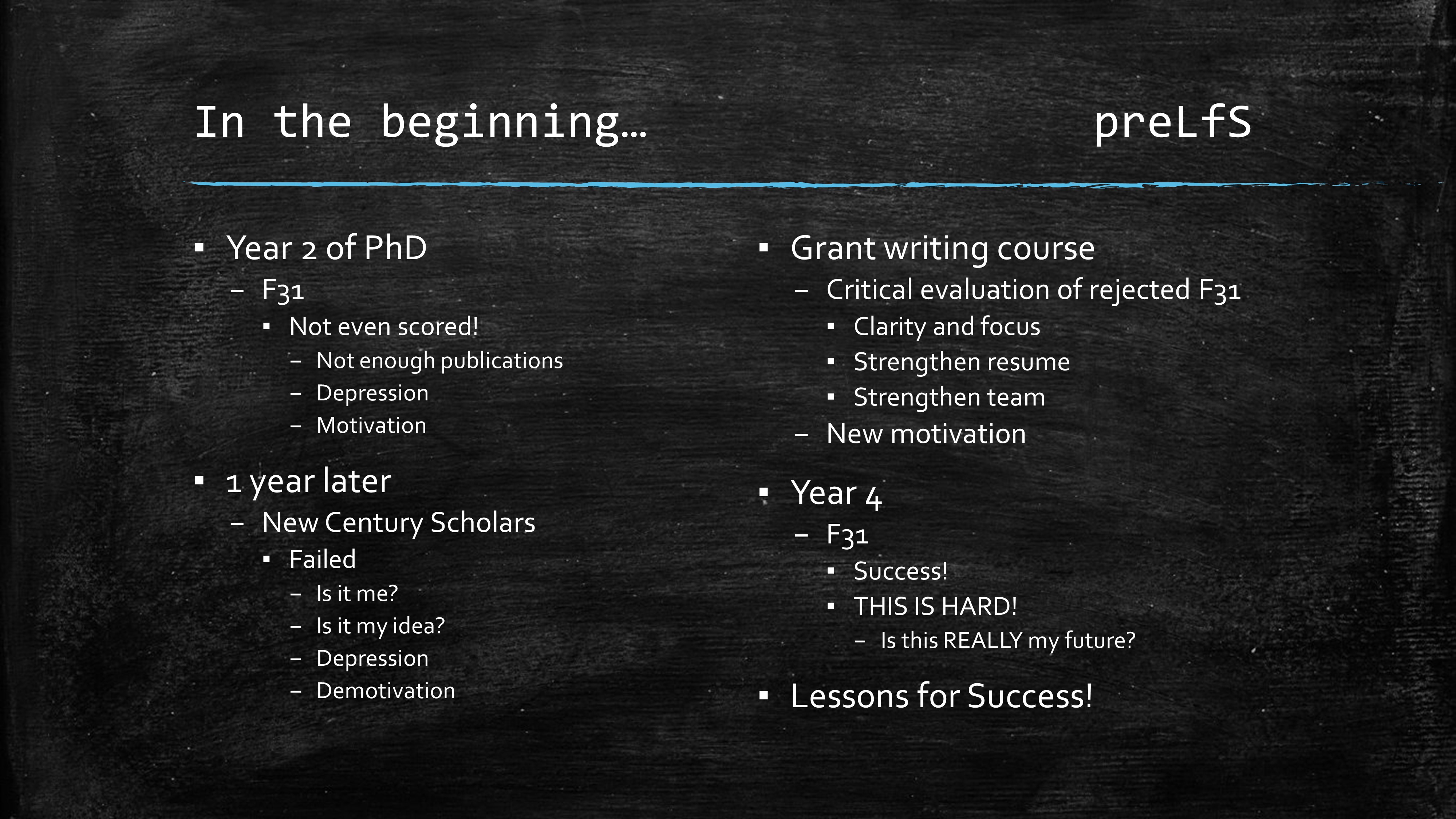
In the beginning, before I was able to come to Lessons for Success, in the second year of my PhD I applied for an F31 grant. I thought this was a great time to apply for this kind of thing. It’ll give me really good experience, hopefully it’ll get funded, this is so exciting.
It was not even scored. They said I didn’t have enough publications. I’m thinking — I’m in the second year of my PhD, why is it that that’s the biggest thing? But it’s something that I learned from. I started to beef up my resume.
I did suffer a little bit of depression. It’s kind of your first blow. But I picked myself up by my bootstraps, and I got a little bit motivated, and I thought, “I’m going to try something else.”
So I applied for the New Century Scholars grant. And I failed. Again. This got me thinking, “Is it me? Is it my idea? Is this right thing for me? Am I in the right profession?”
This time, my depression led me into this weird demotivation. I didn’t want to do anything. Until I took a grantwriting course.
I took this grantwriting course, and the professor asked me to bring in my F31 so we could critically evaluate it and see why it didn’t get funded. And it wasn’t just that I didn’t have enough publications. I needed more clarity and focus. I did need to strengthen my resume. But I also needed to strengthen my team. So I was able to work on that. And this gave me a new motivation.
I submitted the F31 again. I wasn’t going to submit a revision, but this class gave me the motivation to actually submit a revision. And it was funded. That was so fantastic for me.
But I realized: This is really hard. And is this what I’m going to be doing for the rest of my life? Is this what I want to be doing for the rest of my life? I want to do research. I want to work with clinical populations.
Lessons for Success
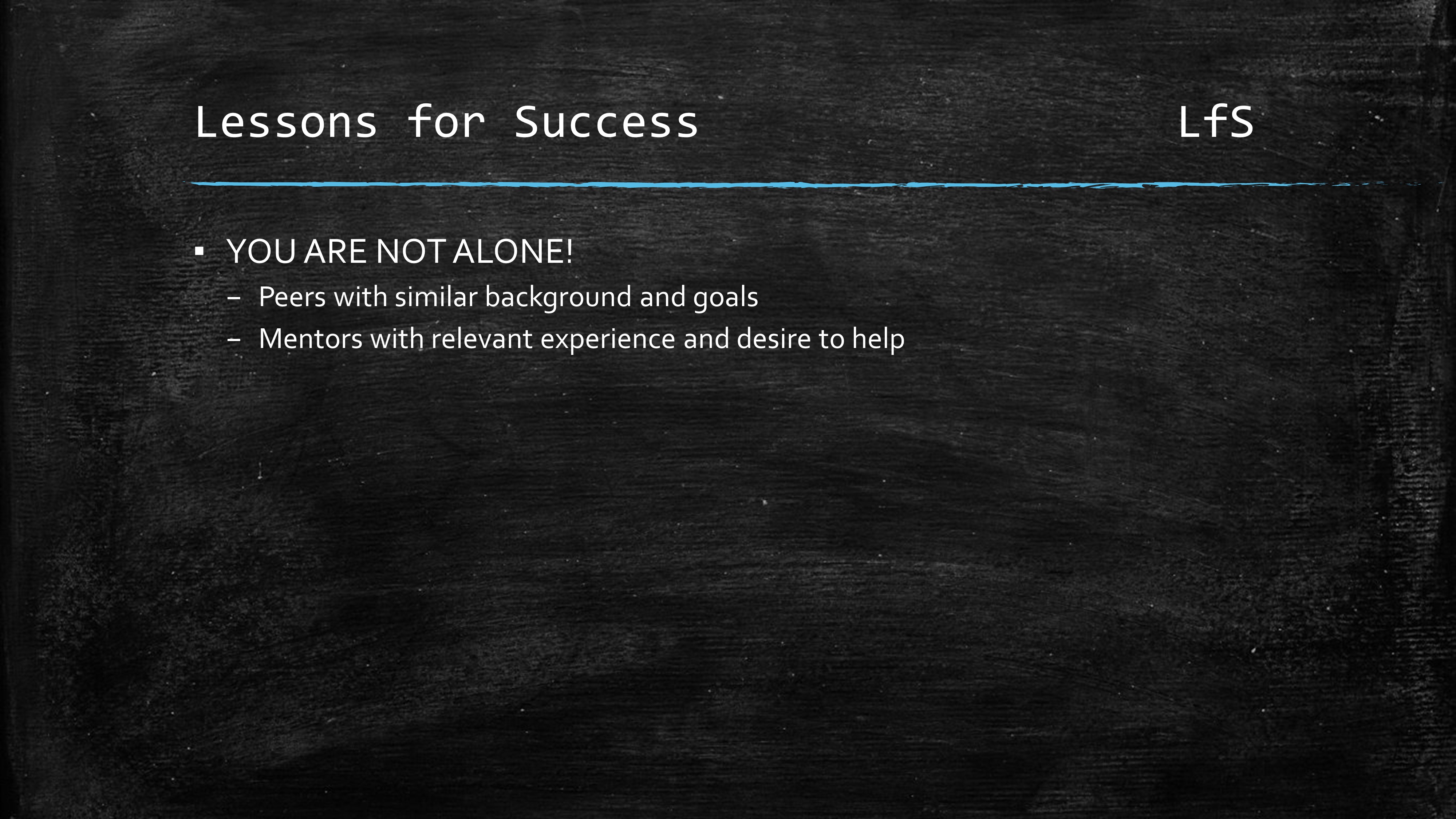
Then I came to Lessons for Success, and it really changed my outlook on grantwriting. During this LfS period, I found out, I’m not alone!
You’re not alone!
We are all in this together, and everybody is experiencing the same problems. We all have similar grantwriting challenges. And it doesn’t seem to matter what stage of your career you’re in. Which is really comforting to me.
You get to meet with peers who have a similar background and goals. Which is fantastic because when you’re in a grantwriting course that’s provided by a conference that you’re at, or just by your university, you get a lot of diversity. And perhaps the things that they’re pandering to aren’t the things that are going to help you in your clinical focus.
We also get these really great mentors that have this fantastic experience. But not just that, they really want to help us.
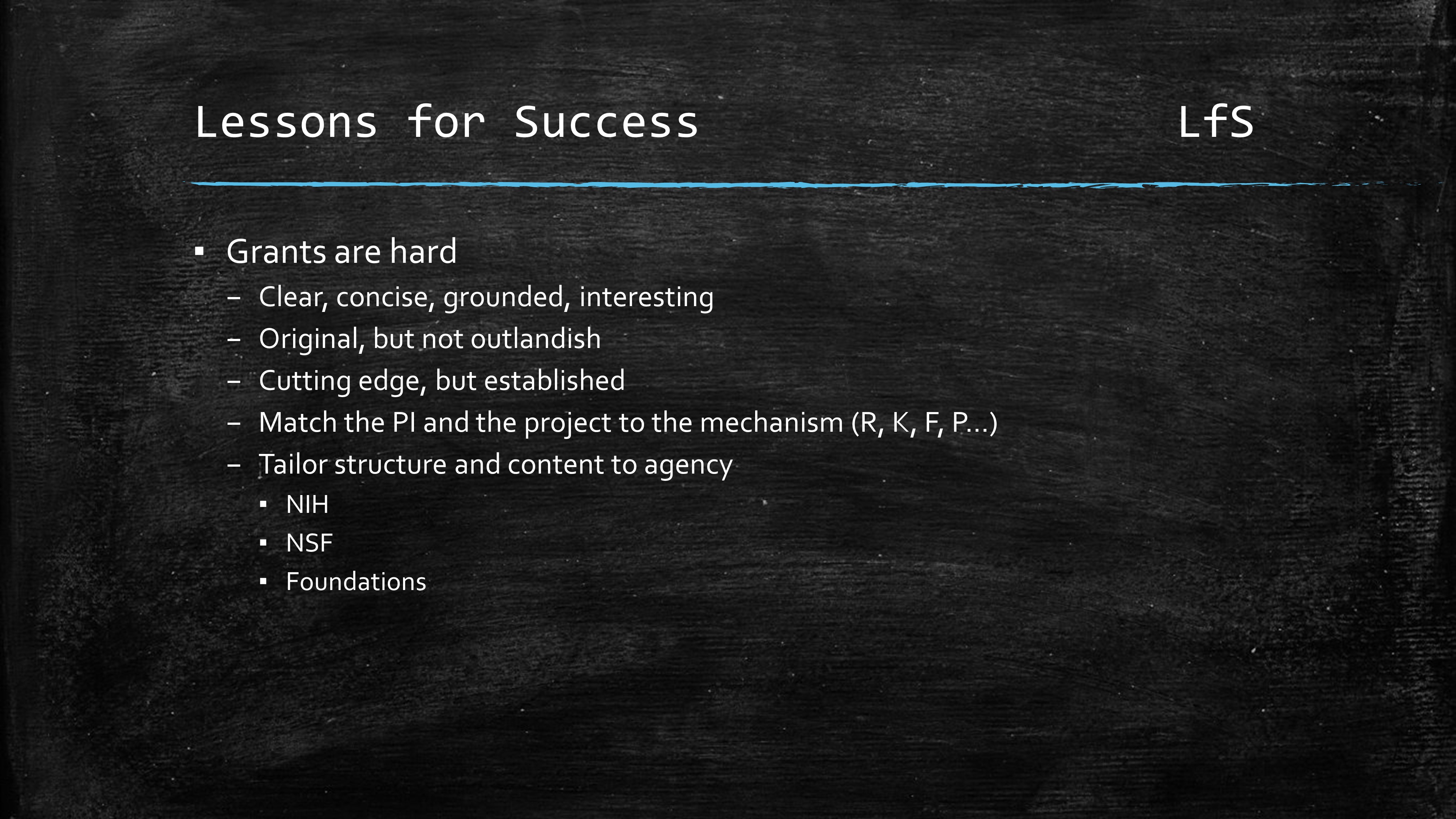
One of the lessons that I learned is that yes, grants are hard. They have to be clear, they have to be concise, they have to be grounded and interesting.
They have to be original, but they can’t be outlandish or overly ambitious.
They have to be cutting edge, but they also have to be established. You have to show that this procedure is established and that you can do it.
You have to match the PI with the funding mechanism. You have to match your grant with the funding mechanism. These are just a few of the funding mechanisms — the R, the F, the K, the P — there’s all these letters and numbers, and this is just for NIH. You also have to tailor the structure and the content to whatever agency you’re going to, whether it’s NIH, or NSF, or some foundation.
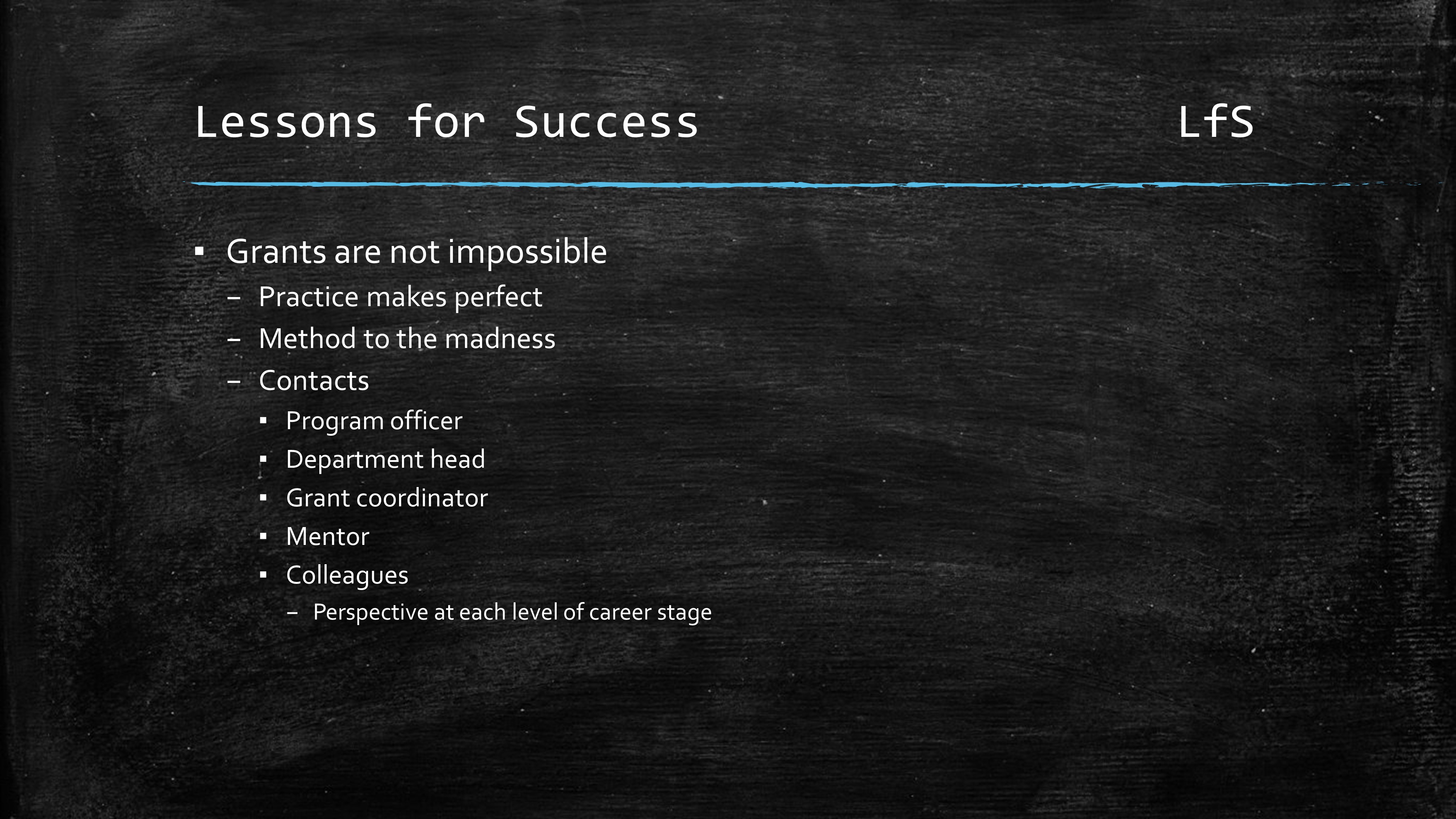
But grants are not impossible. And this was one of the really great lessons that I learned. Practice makes perfect. You just have to keep doing it. You have to make it a habit. You have to practice.
And there’s a method to the madness. You learn this method at Lessons for Success.
You need to make contacts. There are certain people you start to communicate with that will help make your life easier when you’re doing that grantwriting process. The program officer, your own department head in your college, your grant coordinator in the university. Definitely take advantage of your mentors and your colleagues. And your colleagues are all at different stages of their career, and they can give you perspectives at those different stages.
The Aftermath… Post-Lessons for Success
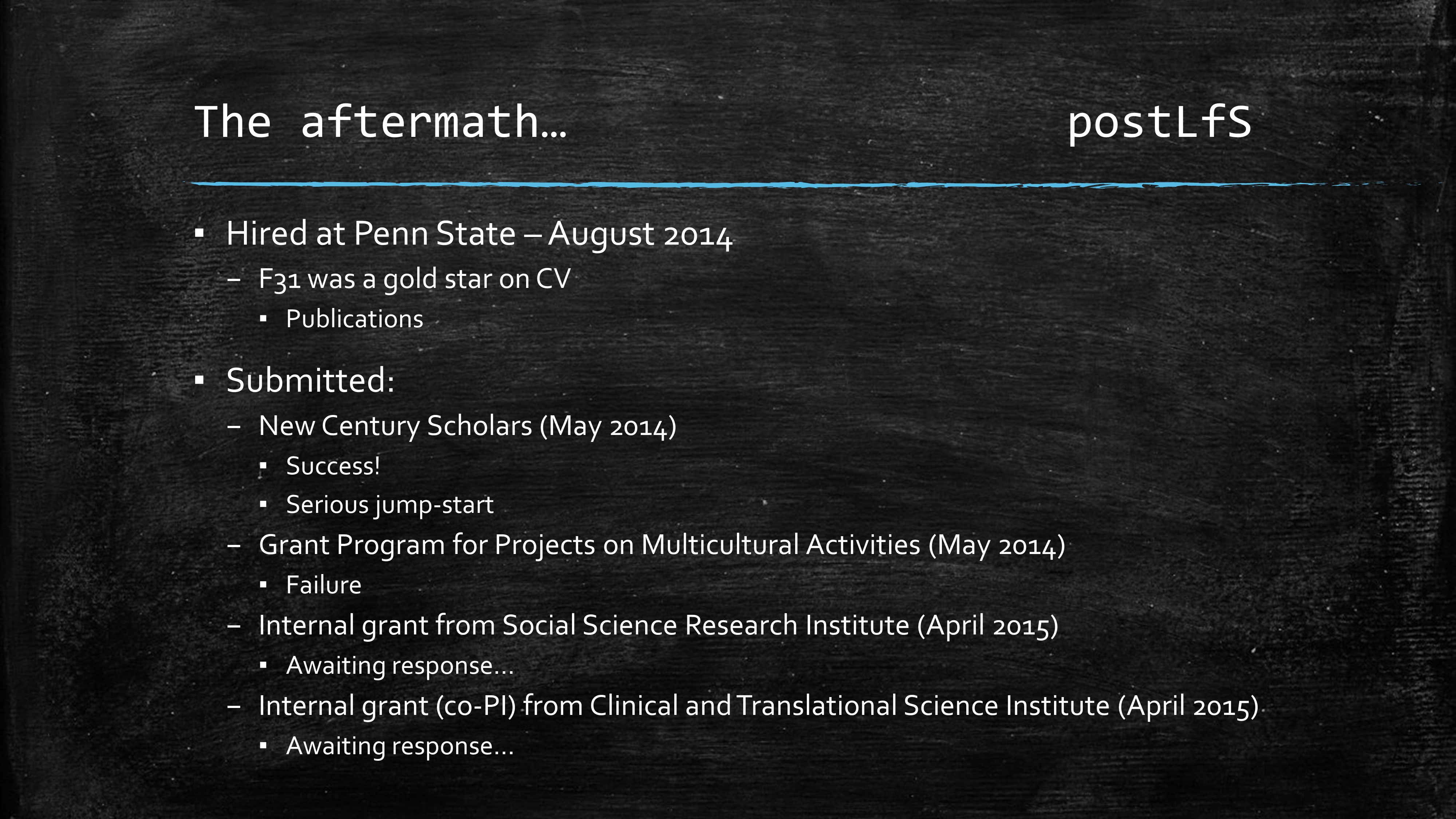
So, what have I done since I came to Lessons for Success?
I got hired at Penn State, which I’m really happy about. Having the F31 was really a gold star on my CV. They really liked that. The fact that I had to beef up my publications in order to get the F31 was also very helpful for when I was interviewing for positions.
Before I actually started, I wanted to get a jump on things. I applied for a New Century Scholars grant in the summer before I started. And I got it. It was a fantastic jump-start. It was something that my department head just loved, he was so excited about it. And it’s really helping me to start off with a bang and start collecting data right away.
I also applied for the Multicultural Activities grant program. I didn’t get this one. But again, our failures are what help us to learn.
Now, I’m actually working — I just submitted an internal grant to the social science research institute. And I am a co-PI on an internal grant for a clinical and translational science institute. So, I’m keeping these small grants going until I can start applying to big grants. We’ll see, cross your fingers, that I can get these internal grants.

I am actually writing another Multicultural Grant, I’m learning from my mistakes, hopefully. And we’ll see how that pans out. I’m also applying for an AARC award in the next week or so.
I have a plan to submit an R03 in October. And I have some ideas for submitting a K grant and for submitting and R21 grant. I don’t have deadlines for those yet — I want to see how they solidify first, because I know this is a long process.
But my goal is to have one submission per cycle. I’m trying to just make it a habit to keep writing grants.
Strategies
So what are some of the strategies that I’ve learned and that I try to follow?
Communication
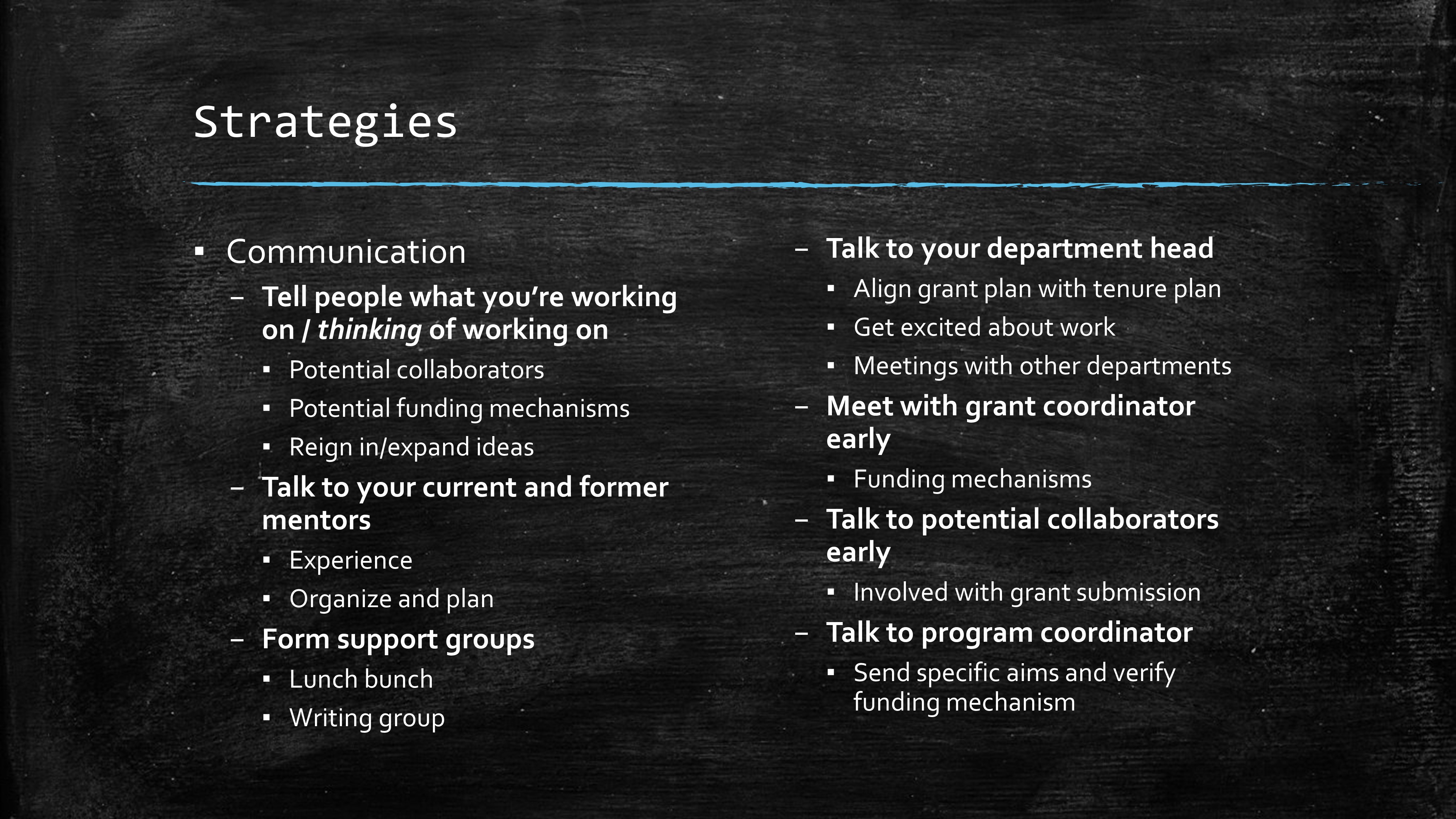
Communication is very important.
Tell people what you’re working on, and tell people what you’re thinking of working on. This will help to get potential collaborators, potential funding mechanisms. It’ll help you rein in or expand your ideas. I can’t tell you how many times I’ve just been casually talking to somebody at the university, not in my department, and all of a sudden we’re making these big plans to start collaborating on something. It almost gives you too much to do. But I’ve also had people say, “Oh, you know what..” The two internal grants was an example of me talking to people just saying what I was thinking of working on and them saying, “Oh, there’s this internal grant from the SSRI, it’s perfect of what you’re looking at. Why don’t you apply for that?”
Talk to your current and former mentors. They have experience, and they can help you organize and plan for the future. They’ve been through it.
Form support groups. I love this. We’ve started a lunch bunch. I do have a mentor in the department, who’s assigned to me, but we also have this informal lunch group. We meet once a week. It’s two senior faculty and three junior faculty, and it’s an informal way to bounce ideas off of each other. This isn’t just for grantwriting, this is for general career help.
I also have a writing group. We meet once a week. We have three minutes to tell each other what our goals for the week were, whether or not we accomplished them, and what our goals for the next week are. It has been a fantastic way to check in. To keep ourselves on the right page. It’s also been a great way to get some feedback — not just on writing, but also on how to manage your time. It’s been a really great experience for me.
Talk to your department head. Try align your grantwriting plan with your tenure and promotion plan. They go hand in hand. It’s a great way to also get feedback, have a sounding board. Are you doing this in the right order? Are you overwhelming yourself? You can also get your department head excited about your work. They go to meetings with other departments, and they can start talking about you to other departments. Perhaps you can start some interdepartmental things.
Meet with your grant coordinator early. They can help you identify potential funding mechanisms.
Talk to potential collaborators early. They need to be involved with the grant submission, and the more that you write and revise, and you have this input from all of your collaborators, the better your grant is going to be.
And talk to your program coordinator. They can help you find the right funding mechanisms for your stage in your career, and the type of project that you want to do.
Learn
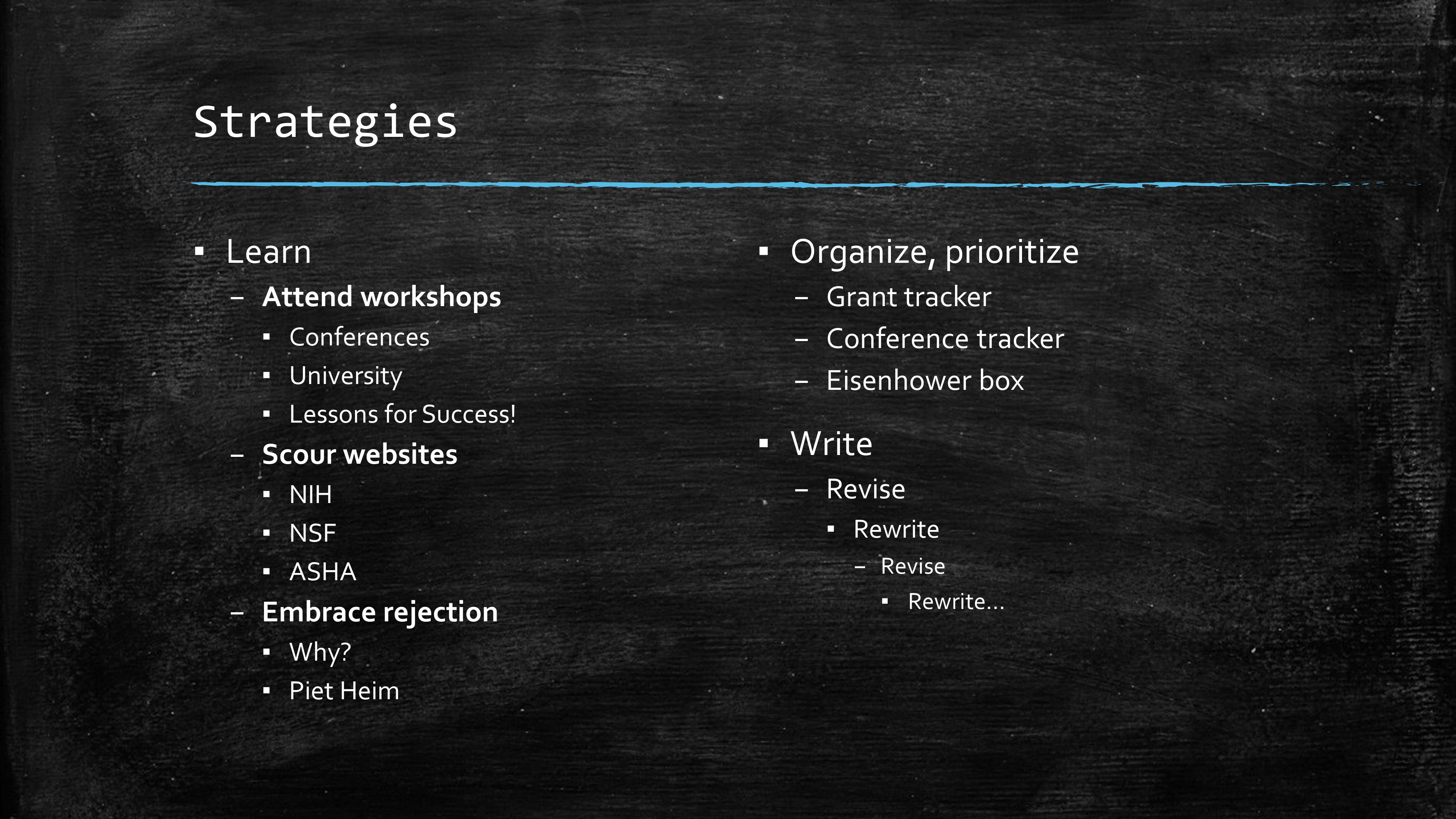
I just want to get as many learning experiences as I can.
Attend workshops. Ones that are provided by the university, ones that are provided by conferences. I learn something new every time I go. I’m still in this bombardment learning stage, where I just need as much input as possible.
Of course, Lessons for Success, we’re already on the right track coming to this conference. I’m so excited to be here again. I feel like this is really a great experience and a great way to learn.
Scour the websites. Go on all of these grant websites and just find out as much information as you can about all these different mechanisms.
And embrace rejections. You get rejected more than you don’t. The reason why you’re getting rejected is going to help make your proposals better and better.
There’s a really great poem by Piet Hein that one of my colleagues turned me onto.
The road to wisdom? — Well, it’s
plain and simple to express:
Err
and err
and err again,
but less
and less
and less.
One of the things I’m really working on is organizing and prioritizing. I have a grant tracker. I have different columns for the different grant mechanisms that I’m thinking about and I’m trying to align the different projects that I have in mind, different collaborators that I have in mind, and the different due dates for all of these grants, just so I can have it all laid out for me and see, “Okay, what comes next, what should I go for, which one is the best for this stage in my career.”
I also have a conference tracker, because I think that’s important, too. To try and get to the conferences that are going to help you get feedback on your projects that are in process.
There is also something called an Eisenhower Box that I really like. If you haven’t heard of this, it’s a way to help you organize what’s important, and what’s urgent, and to figure out what things you need to do right away, what things you need to delegate, what things you need to put off until later, and what things you just need to get rid of and ignore. I’m happy to share that with people later.
And of course, write, and revise, and re-write, and revise, and re-write.
Be a good citizen
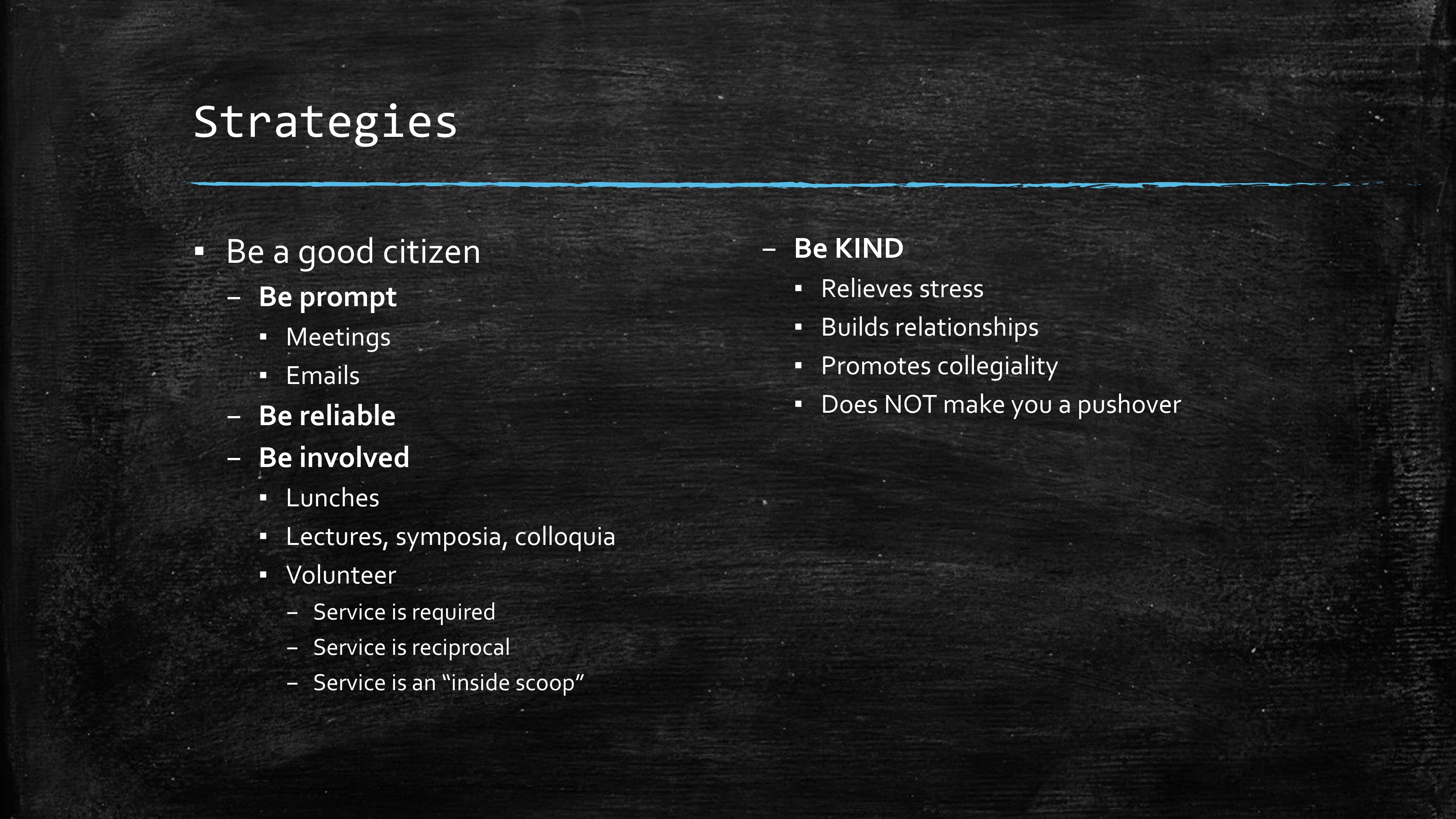
Another thing I wanted to say that I have found, is be a good citizen. It always comes back to you. People like to like people who are nice, and who are good citizens.
Be prompt, get to your meetings on time. Answer your emails on time. Everybody loves the person who responds to their email right away. I know that’s extra pressure, but if you can, why not do it?
Be reliable. Be involved. I’ve started to go to different types of lunches. There’s different symposia and lectures and colloquia. I just learn so much from going there. I’m meeting so many new people. I feel like being a new faculty member, that’s really important for me right now.
And volunteer. Service is required. Service is reciprocal. If you’re on a committee, or you’re within a group, people are going to recognize that and start doing things for you as well. And service is an inside scoop. This is something that I didn’t know, but I found out since I started volunteering for things. You start getting information that you would never have had access to. Just because I volunteered for this special interest group in the biological and life sciences, I met two people, one of whom had a database of stroke patients that he wanted to share with me.
He came up to me afterward, after he found out that I work with people who had a stroke, and he said, “I have this great stroke database, do you want access to it?” And I was like, “Yes! Of course I do. Thank you so much.” And I had somebody from neuroscience come up and ask me if I wanted to be a neuroscience faculty member, which is so fantastic and amazing. I would not have had those experiences if I hadn’t volunteered for this special interest group.
Be kind. It relieves stress. I think it relieves stress. It just makes me happy to be happy and see other people who are happy. It builds relationships with your colleagues. It promotes collegiality. It makes your department happier. And I do not think it makes you a pushover. I’ve heard that before. Where people say, “Ah, if you’re nice, people will walk all over you.” I don’t think so. At least, that hasn’t been the case in my experience.
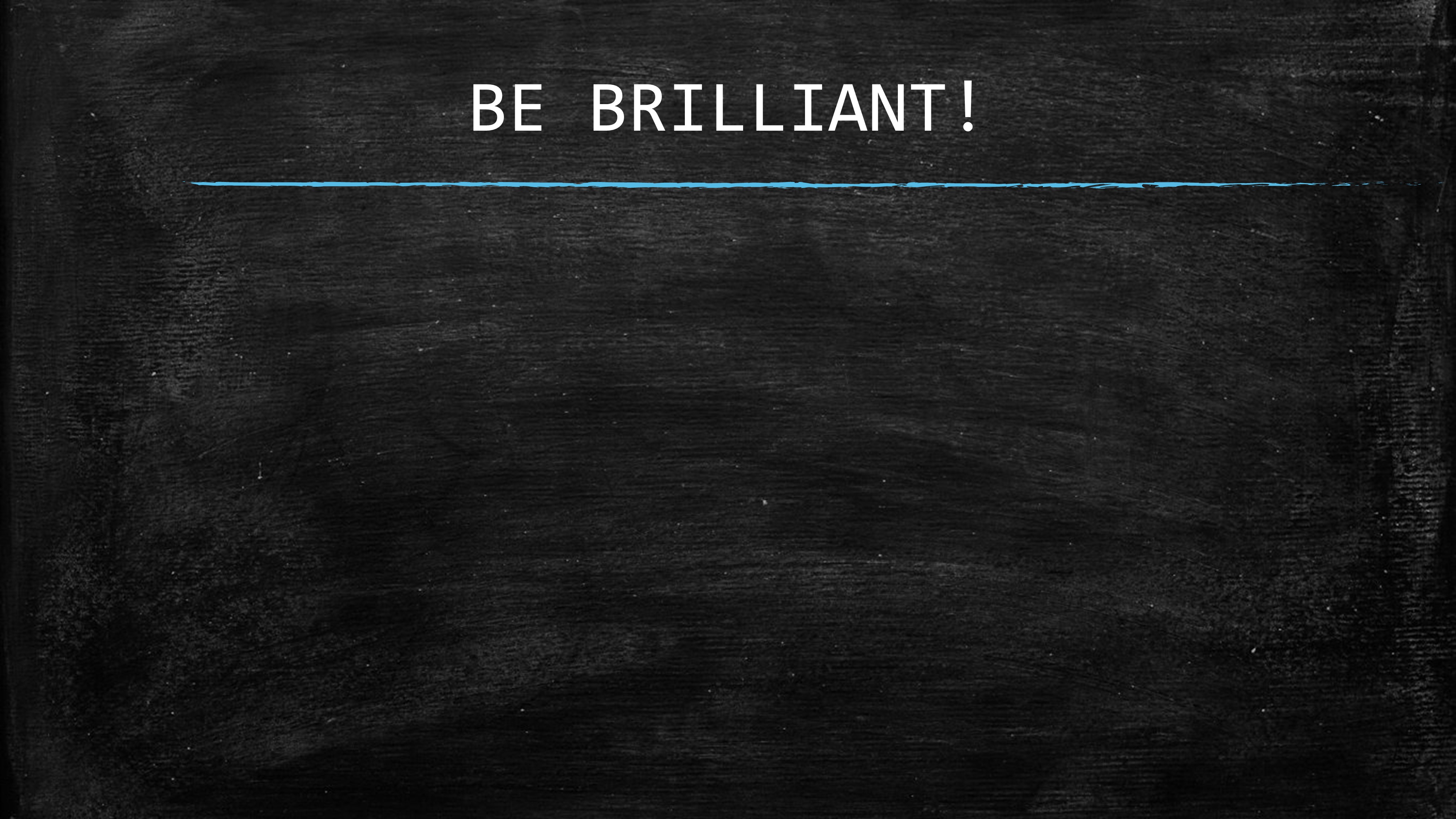
And just finally, in the immortal words of Doctor Who, “Be Brilliant!”
Questions and Discussion
Audience comments on the role of mentors in identifying appropriate service commitments:
I think mentors are really, really important — outside of promotion and tenure. Because you mentioned a lot of things in your presentation. Especially when you talk about service.
Because starting as a junior faculty you want to get involved, you want to be a good citizen. But you really need people to help you pick your spots. In a mentorship committee — it doesn’t need to be somewhere who is specifically in your research area, but other people can help you with career development. I would just say to the junior faculty, if you don’t have a mechanism like that in place, you might start asking. Because it’s extremely helpful. It can resolve a lot of pitfalls before they happen.
Audience comments on the availability of internal grants:
Internal grants will depend enormously on the university, the kind of mechanisms available. At ASU, we don’t have any, we have a different way of doing that. It’s enormously institution dependent.
Chaleece Sandberg:
The two that I applied for, the Level 1, there are others you can apply for, I think it’s $10,000. But it’s the same internal granting agency. They expect you, if you apply for the larger grant, that that’s going to funnel into an NSF or NIH grant.
Audience comments on seeking layperson feedback:
I tried something unique that sounds like it might be helpful given some of the feedback I got on a review of an internal grant. I gave it to a bunch of lay people — people who are non-scientists — because what I was struggling with was communicating my significance about voice, which generally people don’t understand anyway. I was wondering, have you ever tried anything like that, where you seek advice from people who are non-scientists.
Chaleece Sandberg:
The only person I’ve sought advice from who is not a scientist is my husband. And I run everything by him. Because he is actually very analytical, and he knows enough to be an informed layperson, but not enough. So I actually have to explain everything well. I think that’s an excellent idea.





